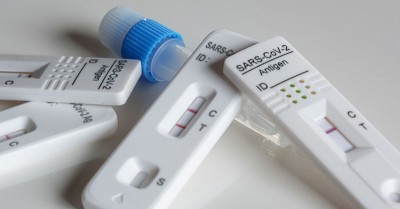NSW Health has advised that people who are symptomatic or are household contacts of a positive case may rely on the results of a Rapid Antigen Test (RAT), instead of awaiting the results of the PCR nose and throat swab from a testing clinic.
The following flow chart developed by NSW Health provide the steps services should follow if you are notified of a positive case that attended the service while infectious.
Flow Chart For Positive Cases In ECEC Services
The steps should be completed within 24 hours of notification of the positive case.
Who should be notified when there’s a COVID-19 case in my service?
If there is a positive case in your service, all staff, children and visitors who were in attendance with the case for the 48 hours prior to the positive COVID-19 swab or onset of symptoms (whichever is earlier), should be notified.
The risk of onward transmission of COVID-19 changes depending on time and location of exposure. The service is responsible for advising those in attendance that they have been exposed to a positive case in your service.
How will I know if I have been exposed to COVID-19?
As the number of people with COVID-19 increases, NSW Health is focusing on contacting people at highest risk of catching/contracting COVID-19. You may not receive a text message or call from NSW Health after being exposed to a person with COVID-19.
We ask people with COVID-19 to tell the people they have spent time with from the 2 days before they started having symptoms or 2 days before they tested positive (whichever came first) that they have COVID-19.
If you are told by someone that you have been in contact with a person with COVID-19, use this advice to understand your risk and what you can do to protect yourself, your family and your community.
Who is at risk of getting infected?
The risk of infection with COVID-19 increases:
- with the amount of time you spend with someone who has COVID-19 and how closely you interacted with them
- when you are indoors (the risk is lower if you are outdoors)
- when you don't wear a mask (the risk is much lower if the person you are with also wears a mask).
Vaccination decreases the risk of getting COVID-19, but this protection reduces over time and can be less effective against certain variants of COVID-19, such as Omicron. Booster doses significantly help increase this protection, including for the Omicron variant. Vaccination is also important in protecting against severe disease. Everyone should get their booster as soon as they are eligible.
How long am I at risk for?
After being exposed to someone with COVID-19 you are at risk of getting it for 14 days. Most people who develop COVID-19 will get it in the first 7 days and so this is when you are at highest risk. However, approximately 25% of cases will develop COVID-19 between day 7 and 14, so you are at risk for up to 14 days.
What should I do if I have been exposed to someone who has COVID-19?
Your risk of getting COVID-19 will be based on the type of contact you had with a person who has COVID-19. When thinking about your testing and isolation requirements, think about your circumstances, including the risk you could infect vulnerable people you live or work with.
All people exposed to someone with COVID-19 should watch carefully for symptoms. If symptoms occur, have a rapid antigen test (RAT) immediately. See the table below for more information on what to do next.
What are my legal requirements?
If you live with someone who has COVID-19 then you must follow the NSW Health Self Isolation Guidelines and self-isolate for 7 days. You must also follow the NSW Health Self-Isolation Guidelines for 7 days if you have been notified to do this by NSW Health.
If your exposure to COVID-19 was someone outside of your household, please assess your own personal risk using the table below. Consider the nature of your contact with the person with COVID-19 and your own personal circumstances, such as the risk that you could infect the people you live or work with, especially if they have conditions that make them more susceptible (for example, chronic illness, or on chemotherapy).
Rapid antigen tests (RAT)
- NSW Health have commenced sending an initial amount of RAT kits to all services to allow educators to remain at work.
- If a person has symptoms or returns a positive RAT they should not attend the service.
- Use of RAT testing is optional for services and individuals.
- We will provide more information on future distributions of RAT kits as soon as possible.
- For FDC providers, the RAT kits will be supplied to the service/scheme, not to individual educators.
Household Contacts
If you live with someone who has COVID-19 then you must follow the NSW Health Self Isolation Guidelines and self-isolate for 7 days.
You must also follow the NSW Health Self-Isolation Guidelines for 7 days if you have been notified to do this by NSW Health.
Any updates or exemptions to this setting will be communicated as soon as possible.
Ventilation
Regulation 110 requires indoor spaces to be well ventilated. COVID-19 has raised the need to be even more vigilant about ventilation.
NSW Health advises open or well-ventilated spaces reduce the risk of COVID-19 transmission because infectious particles are more quickly diffused in the open air than in spaces with less ventilation.
Increasing outdoor air ventilation and using outdoor spaces where possible is an important strategy in reducing the risk of aerosol transmission by increasing circulation of outdoor air.
This strategy must be supported by the other COVID safe practices such as vaccination, hygiene and so on.
To mitigate the risk of transmission while indoors services should reduce the number of people in an indoor space at any one time, by separating children and educators into small groups and encouraging them to use different areas of the service; and reduce the amount of time children spend indoor together.
Services can access the most up-to-date advice on ventilation from the NSW Government website and Safe Work Australia.
Family Day Care
Family day care services are no longer classified as household contacts.
If a child/visitor attends the FDC service while infectious the service will need to follow the same steps as outlined for all service types.
If a person who lives in the FDC service (for example the child, husband or wife of the educator) becomes infectious the whole household must isolate and not provide care to children until after the 7-day isolation period lapsed.
For more information: NSW Health, COVID - 19 Guidelines For ECEC Services







 As an Educator in Australia, your pay rate falls under the Children’s Services Award 2010. This award states the minimum amount that an employer can
As an Educator in Australia, your pay rate falls under the Children’s Services Award 2010. This award states the minimum amount that an employer can When working as a qualified Early Childhood Teacher (with a university degree) within a service, your rate of pay will come from the Educational Services
When working as a qualified Early Childhood Teacher (with a university degree) within a service, your rate of pay will come from the Educational Services When working as a Diploma Qualified Educator your pay rate is from the Children's Services Award 2010. This Award states your minimum rate of pay
When working as a Diploma Qualified Educator your pay rate is from the Children's Services Award 2010. This Award states your minimum rate of pay When working as a Cert 3 Qualified Educator, your pay rate is from the Children's Services Award 2010. This Award states your minimum rate of
When working as a Cert 3 Qualified Educator, your pay rate is from the Children's Services Award 2010. This Award states your minimum rate of Educational Leaders play a crucial role in their early childhood service by ensuring that the educational program aligns with best practices and supports the holistic
Educational Leaders play a crucial role in their early childhood service by ensuring that the educational program aligns with best practices and supports the holistic In early childhood education and care, ratios are more than a technicality—they are a frontline safeguard. Every child deserves responsive supervision, emotional connection, and developmental
In early childhood education and care, ratios are more than a technicality—they are a frontline safeguard. Every child deserves responsive supervision, emotional connection, and developmental With the new national child safety reforms kicking in on 1 September 2025, early childhood services like yours have a real opportunity to lead the
With the new national child safety reforms kicking in on 1 September 2025, early childhood services like yours have a real opportunity to lead the Here’s a comprehensive Mobile Phone and Smart Watch Policy tailored for early childhood education and care (ECEC) services in Australia, aligned with the latest 2025
Here’s a comprehensive Mobile Phone and Smart Watch Policy tailored for early childhood education and care (ECEC) services in Australia, aligned with the latest 2025 The Sea of Fish Challenge is a national initiative that invites children, educators, families, and communities to create and display fish artworks as a symbol
The Sea of Fish Challenge is a national initiative that invites children, educators, families, and communities to create and display fish artworks as a symbol Across the early childhood education and care sector, educators are sounding the alarm: current staffing ratios are insufficient to deliver safe, meaningful, and developmentally appropriate
Across the early childhood education and care sector, educators are sounding the alarm: current staffing ratios are insufficient to deliver safe, meaningful, and developmentally appropriate


